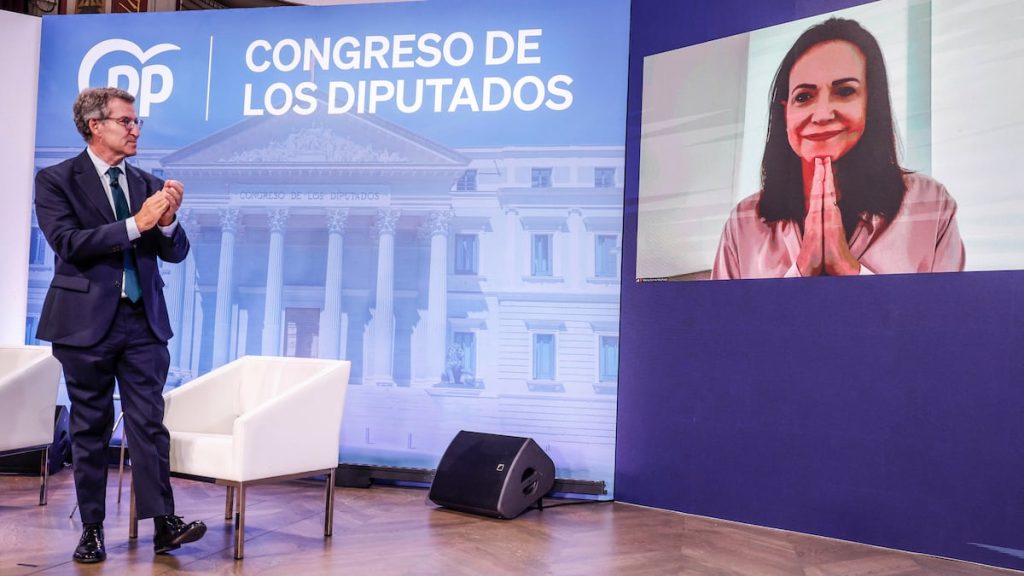After a misstep by Esteban González Pons accusing the Spanish government of participating in a coup in Venezuela and a strong denial from opposition candidate Edmundo González, the battle between the Popular Party (PP) and Nicolás Maduro was somewhat overshadowed. However, José María Aznar urged the party to keep the fight for Venezuela alive during the closing of the FAES foundation campus this Thursday morning. Aznar emphasized the importance of not measuring words when it comes to the crisis in Venezuela and stressed that being on the side of freedom is being on the right side of history. Later in the day, Alberto Núñez Feijóo escalated demands on the government and Spanish companies, warning them against collaborating with Maduro.
Feijóo, in a public dialogue with Venezuelan opposition leader María Corina Machado, called for further action from the Spanish government, urging them to denounce Nicolás Maduro before the International Criminal Court. Feijóo, who had previously led a similar initiative in the Senate, warned that history will judge harshly those who remain neutral in this conflict. He also cautioned Spanish companies against supporting the autocratic regime financially, emphasizing that such actions do not benefit the people but only serve the regime. This call to action comes amidst the presence of sixty Spanish companies operating in Venezuela, including major entities such as Repsol, Acciona, and BBVA.
Feijóo outlined his strategy to seek recognition for Edmundo González by all 27 European Union countries, a move that has not yet been made by any member state. Despite facing criticism for using the Venezuelan cause for political gain, Feijóo defended his stance, claiming that if the Spanish government had supported the democrats in Venezuela, the PP’s position would have been different. He also took a swipe at former Spanish President José Luis Rodríguez Zapatero, who facilitated Edmundo González’s relocation to Spain, contrasting his actions with his own determination to see Maduro removed. The opposition leader Machado expressed optimism about a potential “orderly transition” in Venezuela, describing the current situation as historic and irreversible.
The PP has reignited its focus on Venezuela after briefly shifting the spotlight away due to internal strife caused by González Pons’ remarks. While Venezuela is no longer the central axis of their opposition strategy, Feijóo addressed other international issues such as the diplomatic crisis with Mexico and proposed a social measure to increase the tax deduction for child births. Aznar, earlier in the day, reminded his party members that freedom must be actively defended. The developments in Venezuela, along with the broader international and domestic policy discussions, underscore the ongoing challenges faced by Spain and its political landscape.
As the tensions between the PP, the Spanish government, and the crisis in Venezuela continue to escalate, the stakes for all parties involved are high. The demands for denouncing Maduro, the calls for international recognition of the opposition in Venezuela, and the pressure on Spanish companies to disengage from supporting the regime highlight the complexities of navigating both domestic and international affairs. While the specific outcomes of these political maneuvers remain uncertain, the commitment to the cause of freedom and democracy in Venezuela remains a driving force for the opposition, despite the internal and external challenges they face.


